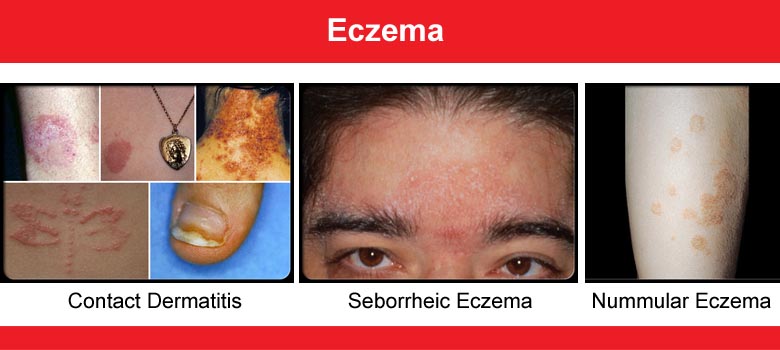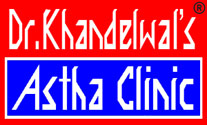
Eczema is "a general term for any superficial inflammatory process involving the epidermis primarily, marked early by redness, itching, minute papules and vesicles, weeping, oozing and crusting, and later by scaling, lichenification and often pigmentation."1 It is also used specifically to refer to the condition atopic dermatitis.
Types of eczema
- Allergic contact eczema (dermatitis) A reaction where the skin has come into contact with a substance that the immune system recognizes as foreign.
- Contact eczema A localized reaction where the skin has come into contact with an allergen.
- Dyshidriotic eczema Irritation of skin on palms of hands and soles of feet, characterized by blisters.
- Neurodermatitis Scaly patches of skin on head, forearms, wrists, lower legs caused by localized itch such as an insect bite.
- Nummular eczema Circular patches of irritated skin that can be crusted, scaling and itchy.
- Seborrheic eczema Oily, scaly yellowish patches of skin, usually on scalp and face. The rash characteristically appears on the scalp, forehead, brows, ears, the folds that extend from the nose to the lips
- Stasis dermatitis Skin irritation on lower legs, usually related to circulatory problems.
Causes of eczema
Pollen is one of the most common eczema allergens. It is unknown for certain what specifically causes eczema, but it is believed to result due to a combination of hereditary and environmental factors.Children are more likely to develop eczema if a parent has had it or another atopic disease. If both parents have an atopic disease, the chances increase further. Environmental factors are also known to bring out the symptoms of eczema.These include.
- Irritants Soaps, detergents, shampoos, disinfectants, juices from fresh fruits, meats or vegetables
- Allergens Dust mites, pets, pollens, mold, dandruff
- Microbes Bacteria such as Staphylococcus aureus, viruses, certain fungi
- Hot and cold temperatures Hot weather, high and low humidity, perspiration from exercise
- Foods Dairy products, eggs, nuts and seeds, soy products, wheat
- Stress It is not a cause of eczema but can make symptoms worse
- Hormones Women can experience worsening of eczema symptoms at times when their hormone levels are changing, for example during pregnancy and at certain points in their menstrual cycle.
Dermatological distribution of the skin lesions as per age
Symptoms in Infants
In infants symmetric lesions are found over face (cheeks, forehead, scalp, and trunk), on the outer surface (extensor) of the extremities, scalp (sometimes causing alopecia). In extensive cases rash can be found even on the flexor surfaces of the extremities.
Symptoms in Children
There is presence of symmetric lesions on the wrist, ankles and the flexor areas of the limbs. Generalized lesions spread all over the body can also be found in this age group.
Eczema Symptoms in Adults
Predominantly affects the flexor areas of the arms, legs and neck. Other areas which can be affected are groin, axillary, etc.
Homeopathy & Herbal Treatment for Eczema
- It addresses altered immune system, treating the roots of this autoimmune disease.
- It is not superficial but deep acting; gives lasting to almost permanent results in most cases.
- It is absolutely harmless, safe and non-toxic.
- In homeopathy, eczema has been considered, understood and treated as an external manifestation of an internal disorder. In other words, eczema is a result of a reactive process of the skin, which may be caused by external or internal factors.
- Eczema is more of an end result and not a disease by itself. The characteristic reaction shows up at the level of skin in the form of eczematous rash.
- Any attempt to treat eczema with local application of creams or ointments on the skin, assuming that it is a skin-deep disease, may prove ineffective in the long run.
- Eczema needs to be tackled at a deeper level in order to treat it from the roots. This is best done with the homeopathic treatment.
- At Astha Clinic, with our experience we have successfully treated thousands of cases of eczema over the last 18 years, Now we are expert in handling the different types of eczema cases with utmost care. Our medicine corrects the deviated immune process, which is the root cause of eczema . The medication works to restore this deviated immunity to give rise to a series of repeated and increasingly prolonged remissions in the symptoms, which eventually proceeds to a good control of the disease.
- Parallel to it , side-effects like thinning of the skin, atrophy of skin, secondary fungal and bacterial infections of the skin as we generally notice while taking steroids are completely avoided here.
Duration of Eczema treatment
The total length of treatment varies form case to case, depending of the following factors:
- Duration of Eczema (Atopic Dermatitis)
- Areas affected
- Extent of spread
- Previous medication (Extensive use of oral or local cortisone)
Home Remedies for Eczema
- Home remedies for eczema may be as simple as changing your laundry detergent or fabric softener or as difficult as moving to a new climate or changing jobs. Removing whatever is causing the allergic reaction is the easiest and most effective treatment.
- Prevent dry skin by taking warm (not hot) showers rather than baths. Use a mild soap or body cleanser. Dry yourself very carefully and apply moisturising skin lotions all over your body. Avoid lotions with fragrances or other irritating substances. (Avoid wool/mohair and other irritating fibres)
- Avoid wearing tight-fitting, rough, or scratchy clothing.
- Avoid scratching the rash. If you can't stop yourself from scratching, cover the area with a dressing. Wear gloves at night to minimize skin damage from scratching.
- Anything that causes sweating can irritate the rash. Avoid strenuous exercise during a flare.

